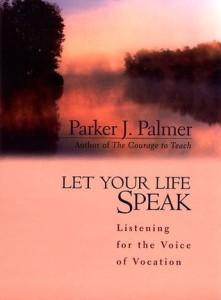“Is the life I am living the same as the life that wants to live in me?”
I love this inquisitive question that Parker Palmer asks in his book, Let Your Life Speak.What resonates most for me in his writing is the idea of using our highest values and truths as a guide toward meaning and purpose in directing our lives. Palmer explores the depths of discovering one’s true vocation while sharing his own heartfelt journey as a teacher.
An Excerpt from Let Your Life Speak
Excerpted from “Let Your Life Speak: Listening for the Voice of Vocation” by Parker J. Palmer. Copyright (c) 2000 by Jossey Bass, Inc., Publishers, a company of John Wiley & Sons, Inc.
I was in my early thirties when I began to wake up to questions about my vocation. By all appearances, things were going well, but the soul does not put much stock in appearances. Seeking a path more purposeful than accumulating wealth, holding power, winning at competition, or securing a career, I had started to understand that is indeed possible to live a life other than one’s own. Fearful that I was doing just that, I would snap awake in the middle of the night and stare for long hours at the ceiling.
Today, some thirty years later, “Let life speak” means something else to me, a meaning faithful both to the ambiguity of those words and to the complexity of my own experience: “Before you tell your life what you intend to do with it, listen for what it intends to do with you.”
My youthful understanding of “Let your life speak” led me to conjure up the highest values I could imagine and then try to conform my life to them. There may be moments in life when we are so unformed that we need to use values like an exoskeleton to keep us from collapsing. But something is very wrong if such moments recur often in adulthood. Trying to live by an abstract norm, will invariably fail–and may even do great damage.Then I ran across the old Quaker saying, “Let your life speak.” I found these words encouraging, and I thought they meant: “Let the highest truths and values guide you.” I lined up the loftiest ideals I could find and set out to achieve them. The results were rarely admirable, often laughable, and sometimes grotesque. But always they were unreal, a distortion of my true self–as must be the case when one lives from the outside in, not the inside out. I had simply found a “noble” way to live a life that was not my own.
Vocation does not come from willfulness. It comes from listening. I must listen to my life and try to understand what is truly about–quite apart from what I would like it to be about–or my life will never represent anything real in the world, no matter how earnest my intentions.Vocation, the way I was seeking it, becomes an act of will, a grim determination that one’s life will go this way or that whether it wants to or not. If the self is sin-ridden and will bow to truth and goodness only under duress, that approach to vocation makes sense. But if the self seeks not pathology but wholeness, then the willful pursuit of vocation is an act of violence toward ourselves–violence in the name of a vision. True self, when violated, will always resist us, sometimes at great cost, holding our lives in check until we honor its truth
That insight is hidden in the word vocation itself, which is rooted in the Latin for “voice.” Vocation does not mean a goal that I pursue. It means a calling that I hear. Before I can tell my life what I want to do with it, I must listen to my life telling me who I am.

